Viola Davis, Quvenzhané Wallis, Ruth Negga, Cynthia Erivo, and #OscarsSoWhite
- Oops!Something went wrong.Please try again later.
- Oops!Something went wrong.Please try again later.
- Oops!Something went wrong.Please try again later.
- Oops!Something went wrong.Please try again later.
- Oops!Something went wrong.Please try again later.
- Oops!Something went wrong.Please try again later.
- Oops!Something went wrong.Please try again later.
The Best Blacktresses: 2010s — Not since the '70s has one decade had so many Black Best Actress Oscar nominees. Then why the backlash?
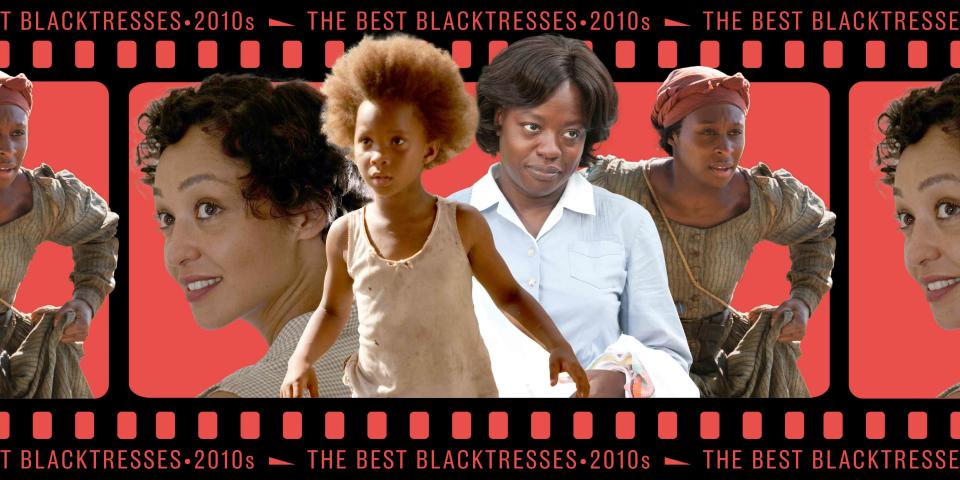
Everett Collection - Design: Alex Sandoval
The Best Blacktresses - The 2010sThe Best Blacktresses is a weekly, seven-part series dedicated to the 13 Black women and their 14 performances (shout-out to two-time nominee Viola Davis) nominated for Best Actress in a Leading Role in the Academy Awards’ nearly 100-year history.
The decade following Halle Berry’s historic win was full of promise and disappointment. But before the close of the 2000s, one of the greatest actors ever emerged.
Viola Davis was born on Aug. 11, 1965, and attended the prestigious Juilliard School, graduating in 1993, the same year Angela Bassett had her breakthrough, Oscar-nominated role in What’s Love Got to Do With It. Primarily a theater actress, Davis made her screen debut with a small, wordless role in the 1996 film Substance of Fire and continued in bit parts for years before her own breakthrough in 2008’s Doubt.
It takes a lot to upstage Meryl Streep, not to mention Amy Adams and Phillip Seymour Hoffman, but with her brief, 10-minute appearance, Davis all but ran away with Doubt, earning her first Oscar nomination, for Best Supporting Actress.
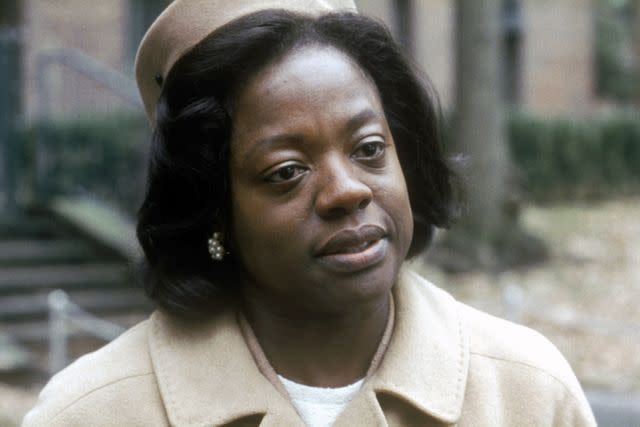
Everett Collection
Viola Davis in 'Doubt'By that point, Davis had already won her first Tony, Best Featured Actress in a Play for August Wilson’s King Hedley II, and would win her second in 2010, Best Lead Actress in a Play for Wilson’s Fences; a role she would reprise on film in 2016, for which she would win her first Oscar — but more on that later.
Doubt eventually led to 2011’s The Help, an adaptation of the 2009 Kathryn Stockett best-selling novel ostensibly about African American domestics working for white families in 1960s Mississippi. But Davis knew in taking the role of Aibileen that the film was less about the experience of its Black characters than of the white characters who interact with them, and she would later express regret for playing the part.
“I just felt that at the end of the day that it wasn’t the voices of the maids that were heard,” Davis told The New York Times in 2018. “I know Aibileen. I know Minny. They’re my grandma. They’re my mom. And I know that if you do a movie where the whole premise is, I want to know what it feels like to work for white people and to bring up children in 1963, I want to hear how you really feel about it. I never heard that in the course of the movie.”
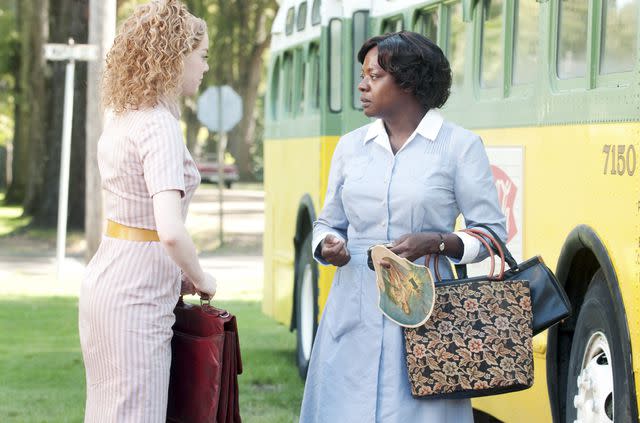
Everett Collection
Emma Stone and Viola Davis in 'The Help'Davis especially felt that her character and the other Black women in the film were not allowed to be angry, to express their true feelings about their white employers.
“[T]he anger, the vitriol, and the hatred that they would have towards these white women if they were asked, if they were put in a situation where they were isolated, would have been vocalized,” Davis said in an interview with BAFTA. “But in reality, if you were to isolate those women, and there was actually one scene where this one woman did express her anger, it was removed from the movie. These Black women would hate these women.”
The vision of Black women in The Help is too similar to the image of Black women throughout the history of Hollywood — maids who are benevolent, warm, and loving towards their oppressors. Playing into those stereotypes in the white revisionist fantasy of Gone With the Wind made Hattie McDaniel the first African American to win an Oscar. Davis clearly wanted to play against those stereotypes, but made the concessions she thought she needed to make for the sake of her career.
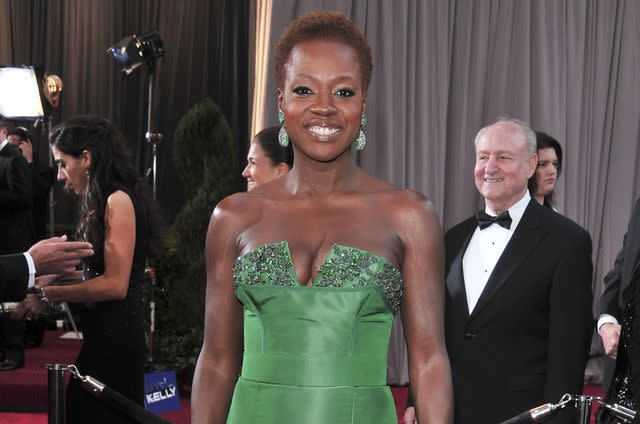
George Pimentel/WireImage
Viola Davis at the 2012 Academy AwardsDespite her misgivings, Davis knew the film would bring a significant boost to her profile, and she was right. A box office hit, The Help earned four Oscar nominations, including Best Picture and Davis’ first Best Actress nomination, while her costar Octavia Spencer took home the Best Supporting Actress trophy. In a rather so-so year, Davis was up against perennial also-ran Glenn Close for Albert Nobbs, Rooney Mara for The Girl With the Dragon Tattoo, Michelle Williams for My Week With Marilyn, and eventual winner Meryl Streep for The Iron Lady, who took home her third Oscar.
Though The Help and her Best Actress nomination brought Davis to a new level of recognition, Davis ended up turning her attention to television, starring in Shonda Rhimes’ How to Get Away With Murder for six seasons because the movie roles just weren’t there. Just as they had not been there for every Black actress who had climbed that prestigious Best Actress mountain.
“Listen, I got [2018’s all-female heist thriller] Widows,” Davis told Vanity Fair in 2020, “but if I just relied on the Hollywood pipeline…. No, there are not those roles.”
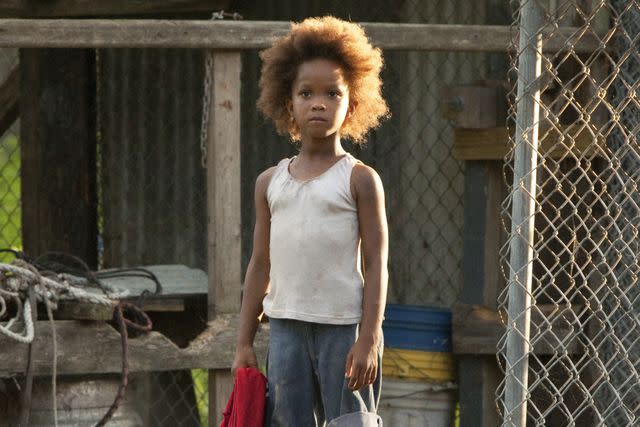
Everett Collection
Quvenzhané Wallis in 'Beasts of the Southern Wild'In 2012, a little film began making a big noise on the film festival circuit and its little star ended up making history. Beasts of the Southern Wild is a fantastical fairytale set in a flood-ravaged Louisiana. Newcomer Quvenzhané Wallis was only 6 when she filmed her role as Hushpuppy, a young girl fighting to save her home and her ailing father. At 9, Wallis became the youngest person nominated for a Best Actress Oscar — a record that will most likely stand the test of time.
Wallis was up against Jessica Chastain in Zero Dark Thirty, Emmanuelle Riva in Amour, and Naomi Watts in The Impossible, but they all lost to Jennifer Lawrence in Silver Linings Playbook.
The youngest Oscar winner in history is Tatum O’Neal, who won Best Supporting Actress at 10 for 1973’s Paper Moon. It’s really difficult for child actors to transition to adult roles, particularly with something as heavy as an Oscar on their shoulder, casting a shadow on all future roles. And then there’s the nagging fear that maybe that Oscar, win or nomination, was just a fluke. O'Neal's career had decidedly peaked before she hit puberty.
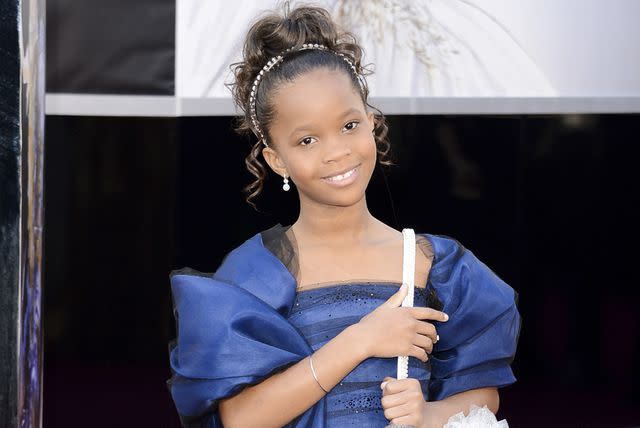
Jason Merritt/Getty Images
Quvenzhané Wallis at the 2013 Academy AwardsWallis is now only 20 years old, with her entire career ahead of her. Who's to say what earning an Oscar nomination at such a young age will mean for her as an actor? That’s really up to her to decide. She’s had roles in Black-ish, Annie, Swagger, American Horror Stories, and perhaps most importantly, Beyoncé’s Lemonade. Wallis is also coming of age in a Hollywood where there’s more opportunity, or at least the illusion of opportunity, for young Black actresses. The future is hers to create.
Meanwhile, Davis is never not going to act the s--- out of something, so for her role as professional hot mess Annalise Keating on HTGAWM, Davis became the first African American to win an Outstanding Lead Actress in a Drama Emmy in 2015.
That year, the Television Academy could pat itself on the back for its show of diversity while the Motion Picture Academy was roiled by the #OscarsSoWhite controversy. The hashtag, created by activist April Reign, started trending on Black Twitter after all 20 acting nominations went to white actors. The previous year, 12 Years a Slave had won three Oscars — Best Picture, Best Adapted Screenplay, and Best Supporting Actress for Lupita Nyong’o. In 2015, Ava DuVernay’s Selma was nominated for Best Picture, but she was left out of the Best Director race and David Oyelowo was snubbed for a Best Actor nomination.
The Academy ignored the #OscarsSoWhite controversy for the most part, hiring noted Black person Chris Rock to host the 2016 ceremony, which, again, featured all-white acting nominees. After another round of criticism from social media, as well as from prominent people within and outside of the industry, the Academy finally capitulated and made an effort to diversify its voting body.
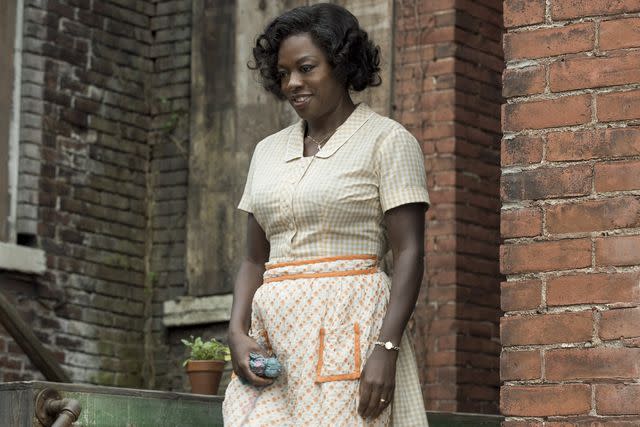
Everett Collection
Viola Davis in 'Fences'Davis finally got her Oscar in 2017 for Fences, the adaptation of the Wilson play for which she won her second Tony, directed by and co-starring fellow greatest living actor Denzel Washington. Though Davis won her Tony as a lead actress for portraying the same role of Rose Maxson, after seeing the film herself, she decided to go for the supporting category that awards season.
It was disappointing, considering how few Black women had been nominated for a lead acting Oscar before her (and that she won her category), and one can’t help but wonder if Davis really thought hers was a supporting role. Or if she simply did the math and knew her best chance at winning would be in supporting, where six Black women had previously won, as opposed to Halle Berry still hanging out by her lonesome as a lead?
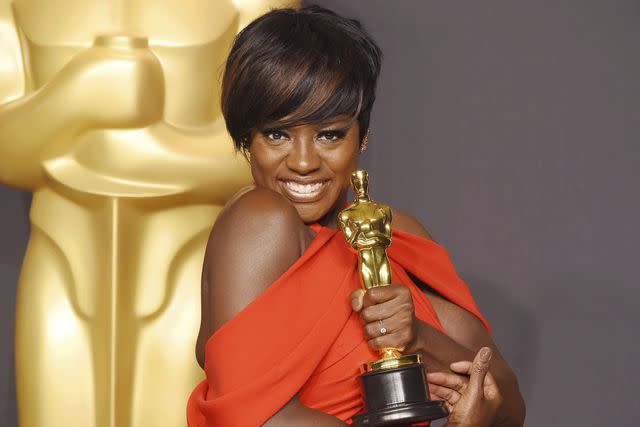
Jeffrey Mayer/WireImage
Viola Davis at the 2017 Academy AwardsStill, by switching categories, Davis may have also made space in the lead category for another Black actress, the Irish-Ethiopian Ruth Negga for Loving. Born in the Ethiopian capital of Addis Ababa on May 4, 1981, Negga started out in the theater before making her screen debut in the 2004 Irish film Capital Letters. She acted steadily in film, theater, and television but Loving was her breakthrough role.
Loving told the story of the couple at the center of the fight to legalize interracial marriage: Richard and Mildred Loving. The 1967 Supreme Court decision Loving v. Virginia ruled that laws banning interracial marriage violated the Equal Protection and Due Process Clauses of the 14th Amendment. The landmark case was also cited in the fight to legalize same-sex marriage.
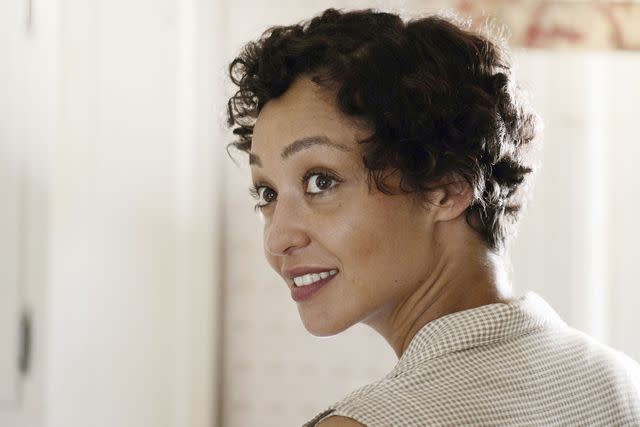
Everett Collection
Ruth Negga in 'Loving'Negga and costar Joel Edgerton both earned raves for their subtle, understated performances as the Lovings, but only Negga was singled out for an Oscar nomination. Following the #OscarsSoWhite backlash, the 2017 Oscars were the Blackest the ceremony had been since Denzel Washington, Halle Berry, and Sidney Poitier were all honored in 2001.
The more diverse voting body probably had something to do with the number of Black nominees, but also it's important to remember that these films had been in development for years. If anything, the banner Blackness of the 2017 Oscars proved that there needs to be more Black films, not just more non-white people in the Academy, to avoid going years where there’s no diversity in American cinema.
That year, there were six Black actors nominated for awards, across all four acting categories, including three Black women for Best Supporting Actress (Davis for Fences, Naomie Harris for Moonlight, and previous winner Octavia Spencer for Hidden Figures). In a particularly competitive year, Negga was up against Natalie Portman for Jackie, Isabelle Huppert for Elle, Meryl Streep for Florence Foster Jenkins, and the category’s winner Emma Stone for La La Land.
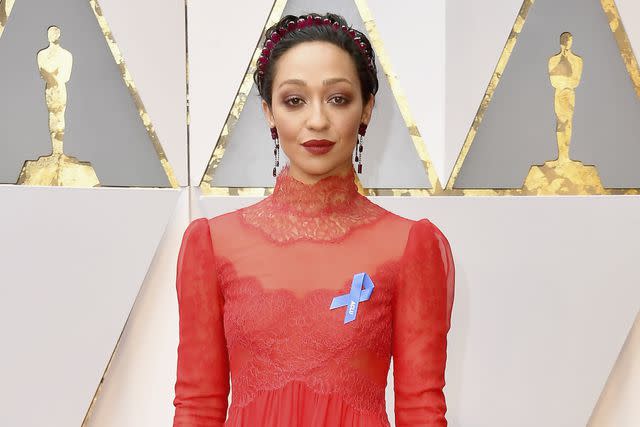
Steve Granitz/WireImage
Ruth Negga at the 2017 Academy AwardsFamously, Moonlight trounced La La Land to win Best Picture, becoming the first film with an all-Black cast to win the top prize. That win actually did feel like a direct reflection of a more diverse voting body — Hollywood really loves films about itself and La La Land seemed a shoe-in, despite its merit (or rather, its lack thereof).
Negga returned to the theater with an acclaimed turn in Hamlet in 2018 and a Tony nomination for her Broadway debut as Lady MacBeth in MacBeth in 2022. She also starred on the AMC series Preacher for three seasons, and in 2021 she earned praise for her performance in Rebecca Hall’s period drama Passing, for which she was nominated for a Best Supporting Actress Golden Globe and a SAG Award, narrowly missing out on another Oscar nomination.
Viola Davis was the first African American to win the Triple Crown of Acting — a competitive Emmy, Oscar, and Tony — and with her Grammy win in 2023, she joined the elite EGOT club. Quickly defying gravity into that hallowed arena is Emmy, Grammy, and Tony winner Cynthia Erivo, who earned two Oscar nominations for 2019’s Harriet, Best Actress and Best Original Song.
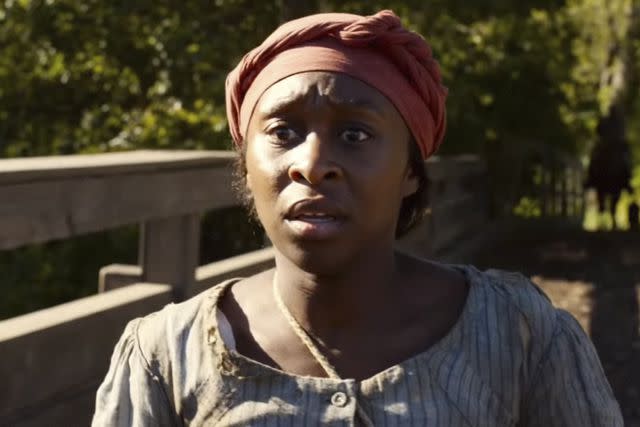
Everett Collection
Cynthia Erivo in 'Harriet'Born Jan. 8, 1987, in Stockwell, London, Erivo came to prominence touring with the U.K. production of Sister Act, the musical adaptation of the beloved film starring Best Blacktresses patron saint Whoopi Goldberg. But it was her role in the 2015 Broadway revival of (again, Whoopi) The Color Purple — for which she won her Emmy, Grammy, and Tony — that made her a star to watch. She made her film debut in the Viola Davis-led Widows before assuming the role of Harriet Tubman in the biopic Harriet.
Davis had been attached to star in and produce a Tubman biopic of her own around 2015, but it never came to fruition. Meanwhile, Erivo received some backlash for taking on the part since she is of British-Nigerian descent. The criticism was ridiculous, at best, especially when you look at the sheer number of non-American actors playing American heroes: British-Nigerian David Oyelowo as Martin Luther King, Jr; Irish-Ethiopian Ruth Negga as Mildred Loving, not to mention Aussie Joel Edgerton as her husband. An American playing an American will never be as convincing as an Australian playing an American — and that’s just facts.
Erivo would prove her detractors wrong, however, going toe-to-toe for the Best Actress Oscar with Scarlett Johansson in Marriage Story, Saoirse Ronan (speaking of convincingly American foreigners) in Little Women, Charlize Theron in Bombshell, and that year’s controversial (among the homosexuals) winner, Renée Zellweger in Judy.
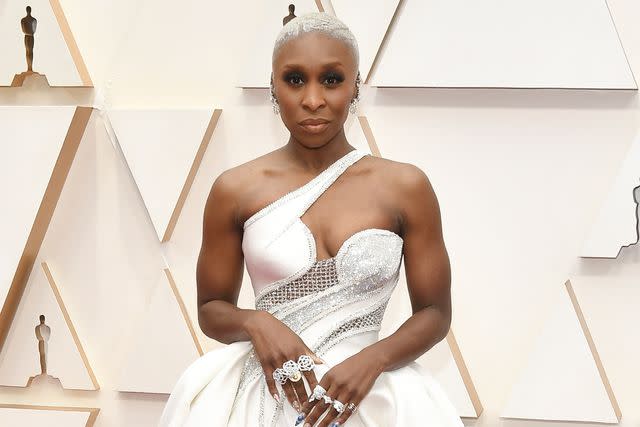
Amy Sussman/Getty Images
Cynthia Erivo at the 2020 Academy AwardsBut don’t cry for Erivo, Argentina; she’ll get her Oscar, one way or another. She’s a once-in-a-generation talent like Viola Davis, like Angela Bassett, like Whoopi Goldberg. The thing about the #OscarsSoWhite controversy is that it happened because Black audiences had grown accustomed to seeing themselves on screen; accustomed to richer, more complex depictions of Black life on film, thanks in part to Davis, Bassett, Goldberg, Denzel Washington, Halle Berry, Spike Lee, Ava DuVernay, etc, etc. And so when the Academy — which is supposed to represent the best and most "worthy" in film — was asleep at the wheel, Black audiences felt entitled, as they should, to wake them the f--- up.
Yet, entering into the 2020s, some of the old problems persist.
Check out more from EW's The Awardist, featuring exclusive interviews, analysis, and our podcast diving into all the highlights from the year's best in TV.
Related content:
The Best Blacktresses - 1970s: Diana Ross, Cicely Tyson, and Diahann Carroll
The Best Blacktresses - 2010s: Halle Berry and Gabourey Sidibe
Read the original article on Entertainment Weekly.

